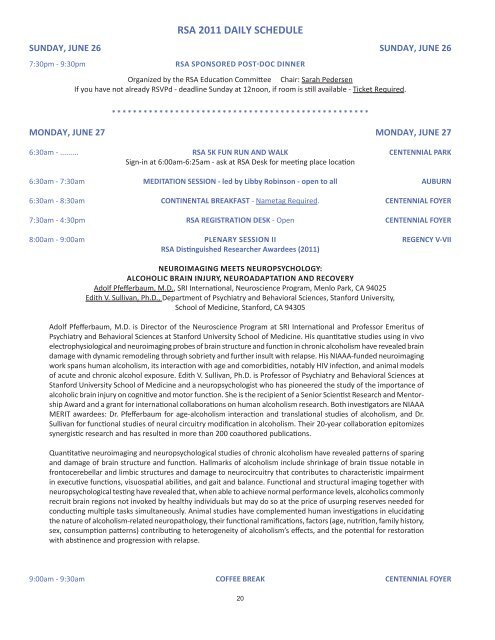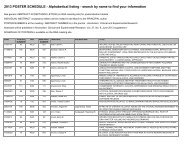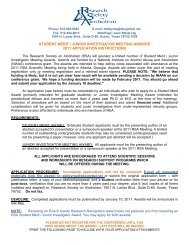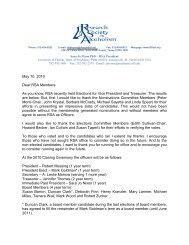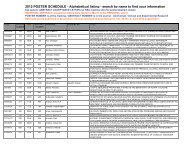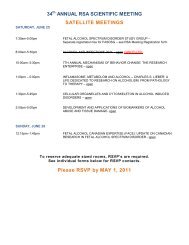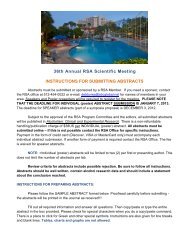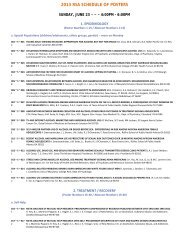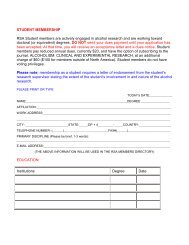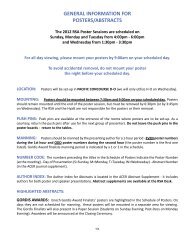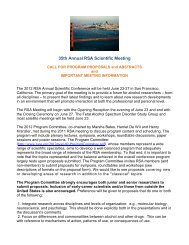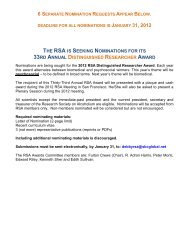RSA 2011 DAILY SCHEDULE - Research Society on Alcoholism
RSA 2011 DAILY SCHEDULE - Research Society on Alcoholism
RSA 2011 DAILY SCHEDULE - Research Society on Alcoholism
You also want an ePaper? Increase the reach of your titles
YUMPU automatically turns print PDFs into web optimized ePapers that Google loves.
<str<strong>on</strong>g>RSA</str<strong>on</strong>g> <str<strong>on</strong>g>2011</str<strong>on</strong>g> <str<strong>on</strong>g>DAILY</str<strong>on</strong>g> <str<strong>on</strong>g>SCHEDULE</str<strong>on</strong>g><br />
SUNDAY, JUNE 26 SUNDAY, JUNE 26<br />
7:30pm - 9:30pm<br />
<str<strong>on</strong>g>RSA</str<strong>on</strong>g> SPONSORED POST-DOC DINNER<br />
Organized by the <str<strong>on</strong>g>RSA</str<strong>on</strong>g> Educati<strong>on</strong> Committee Chair: Sarah Pedersen<br />
If you have not already RSVPd - deadline Sunday at 12no<strong>on</strong>, if room is still available - Ticket Required.<br />
* * * * * * * * * * * * * * * * * * * * * * * * * * * * * * * * * * * * * * * * * * * * * * * * *<br />
MONDAY, JUNE 27 MONDAY, JUNE 27<br />
6:30am - ......... <str<strong>on</strong>g>RSA</str<strong>on</strong>g> 5K FUN RUN AND WALK CENTENNIAL PARK<br />
Sign-in at 6:00am-6:25am - ask at <str<strong>on</strong>g>RSA</str<strong>on</strong>g> Desk for meeting place locati<strong>on</strong><br />
6:30am - 7:30am MEDITATION SESSION - led by Libby Robins<strong>on</strong> - open to all AUBURN<br />
6:30am - 8:30am CONTINENTAL BREAKFAST - Nametag Required. CENTENNIAL FOYER<br />
7:30am - 4:30pm <str<strong>on</strong>g>RSA</str<strong>on</strong>g> REGISTRATION DESK - Open CENTENNIAL FOYER<br />
8:00am - 9:00am PLENARY SESSION II REGENCY V-VII<br />
<str<strong>on</strong>g>RSA</str<strong>on</strong>g> Distinguished <str<strong>on</strong>g>Research</str<strong>on</strong>g>er Awardees (<str<strong>on</strong>g>2011</str<strong>on</strong>g>)<br />
NEUROIMAGING MEETS NEUROPSYCHOLOGY:<br />
ALCOHOLIC BRAIN INJURY, NEUROADAPTATION AND RECOVERY<br />
Adolf Pfefferbaum, M.D., SRI Internati<strong>on</strong>al, Neuroscience Program, Menlo Park, CA 94025<br />
Edith V. Sullivan, Ph.D., Department of Psychiatry and Behavioral Sciences, Stanford University,<br />
School of Medicine, Stanford, CA 94305<br />
Adolf Pfefferbaum, M.D. is Director of the Neuroscience Program at SRI Internati<strong>on</strong>al and Professor Emeritus of<br />
Psychiatry and Behavioral Sciences at Stanford University School of Medicine. His quantitative studies using in vivo<br />
electrophysiological and neuroimaging probes of brain structure and functi<strong>on</strong> in chr<strong>on</strong>ic alcoholism have revealed brain<br />
damage with dynamic remodeling through sobriety and further insult with relapse. His NIAAA-funded neuroimaging<br />
work spans human alcoholism, its interacti<strong>on</strong> with age and comorbidities, notably HIV infecti<strong>on</strong>, and animal models<br />
of acute and chr<strong>on</strong>ic alcohol exposure. Edith V. Sullivan, Ph.D. is Professor of Psychiatry and Behavioral Sciences at<br />
Stanford University School of Medicine and a neuropsychologist who has pi<strong>on</strong>eered the study of the importance of<br />
alcoholic brain injury <strong>on</strong> cognitive and motor functi<strong>on</strong>. She is the recipient of a Senior Scientist <str<strong>on</strong>g>Research</str<strong>on</strong>g> and Mentorship<br />
Award and a grant for internati<strong>on</strong>al collaborati<strong>on</strong>s <strong>on</strong> human alcoholism research. Both investigators are NIAAA<br />
MERIT awardees: Dr. Pfefferbaum for age-alcoholism interacti<strong>on</strong> and translati<strong>on</strong>al studies of alcoholism, and Dr.<br />
Sullivan for functi<strong>on</strong>al studies of neural circuitry modificati<strong>on</strong> in alcoholism. Their 20-year collaborati<strong>on</strong> epitomizes<br />
synergistic research and has resulted in more than 200 coauthored publicati<strong>on</strong>s.<br />
Quantitative neuroimaging and neuropsychological studies of chr<strong>on</strong>ic alcoholism have revealed patterns of sparing<br />
and damage of brain structure and functi<strong>on</strong>. Hallmarks of alcoholism include shrinkage of brain tissue notable in<br />
fr<strong>on</strong>tocerebellar and limbic structures and damage to neurocircuitry that c<strong>on</strong>tributes to characteristic impairment<br />
in executive functi<strong>on</strong>s, visuospatial abilities, and gait and balance. Functi<strong>on</strong>al and structural imaging together with<br />
neuropsychological testing have revealed that, when able to achieve normal performance levels, alcoholics comm<strong>on</strong>ly<br />
recruit brain regi<strong>on</strong>s not invoked by healthy individuals but may do so at the price of usurping reserves needed for<br />
c<strong>on</strong>ducting multiple tasks simultaneously. Animal studies have complemented human investigati<strong>on</strong>s in elucidating<br />
the nature of alcoholism-related neuropathology, their functi<strong>on</strong>al ramificati<strong>on</strong>s, factors (age, nutriti<strong>on</strong>, family history,<br />
sex, c<strong>on</strong>sumpti<strong>on</strong> patterns) c<strong>on</strong>tributing to heterogeneity of alcoholism’s effects, and the potential for restorati<strong>on</strong><br />
with abstinence and progressi<strong>on</strong> with relapse.<br />
9:00am - 9:30am COFFEE BREAK CENTENNIAL FOYER<br />
20


